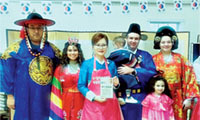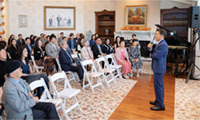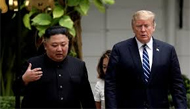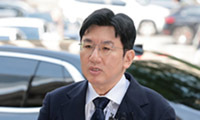▶ Memories of scarcity turn many Chinese into stubborn savers.
BEIJING - He does not know it yet, but Dang Fu has been chosen to save the Chinese economy.
A millet farmer from northeast China, Mr.Dang, 56, has managed to save twothirds of his family’s $2,200 annual income in recent years. He grows much of his own food, wears a winter coat until it is ready for the rag heap and buys niceties only when his wife’s nagging becomes intolerable.
Last year’s indulgence, a new television, still makes him wince.“It was painful to spend so much money,”he said. But such tenacious thrift, once an admirable quality here, has become a liability as the nation’s export-driven economy slows, a prospect that has stoked the government’s fear of unemployment and social instability.
In recent weeks China’s once unstoppable economy has slowed sharply. Export growth, one of the main contributors to China’s expansion over the past decade, has receded and seems likely to reduce overall growth next year, according to the World Bank. The stock market is in a lull and property values in many cities are off 30 to 40 percent.
China’s annualized growth rate, which stood at 12 percent during the Olympics, has already slid to 9 percent, an admirable number by any standard but ominously close to the 8 percent figure that Chinese economists say is required to provide jobs to the 20 million people who enter the work force every year. J.P.Morgan recently cut its fourth-quarter growth forecast for China to 7.7 percent, and other analysts predict that number could hit 5 percent next year.
Government analysts are looking to consumers, especially the country’s hundreds of millions of high-saving peasants, to help solve the problem.“If we can boost people’s confidence and they spend more money, it will not only be beneficial to China but it will help stabilize the world’s economy,” Zhu Guangyao, the assistant finance minister, said.
But getting people to spend more, especially in the face of an economic slowdown, may be difficult. Consumer spending makes up 35 percent of China’s gross domestic product, and that number has been dropping since the 1980s, when it stood at 50 percent; consumer activity in the United States, by contrast, is responsible for more than two-thirds of the economy.
Western economists suggest that to offset slumping exports and a slowdown in construction, Chinese consumers would have to increase their spending by a third.“I’m not sure they’re capable of doing that as quickly as the government would like,”said Michael Pettis, a professor of finance at Peking University.
Realistic or not, Beijing seems determined to give it a try. Although it is weighted toward bridge-building and highwaypaving initiatives, the $586 billion stimulus package announced by the government in November includes a range of incentives intended to get Mr.Dang and people like him to spend money.
The measures include subsidized housing to persuade homebuyers to fill their new dwellings with furniture, and rural electrification projects that will give farmers access to affordable power. On December 1, the government introduced a subsidy in 14 provinces that would make it cheaper for people to buy cellphones, washing machines and flat-screen televisions.
Mr.Dang and his wife, Zhang Fengxia, 52, are the apotheosis of Chinese thrift. They do not use banks - “better to keep money at home,”Ms.Zhang said - and the couple’s biggest expenditure was a used tractor they bought for $1,200 a few years ago. Everything else is set aside for their retirement and for potential medical costs.
Asked if she would use a credit card if one were given to her, Ms.Zhang looked confounded.“What’s a credit card-” she asked, adding,“We have everything we need.”
Although high savings rates can be found across Asia, the Chinese propensity to save is rooted in deep-seated memories of scarcity and a tattered social safety net that forces people to save up for education, retirement and medical costs.
“Health care is so expensive and distorted that no matter how much you save, if you get sick you’re going to end up poor,”said Wang Tao, a Beijing-based analyst at USB Securities.“America’s health care problems can’t even compare.”
For the moment, it is people like Li Xiuqing who hold the greatest promise for China’s emerging consumer economy. A secretary in a Beijing accounting firm, Ms.Li, 28, makes less than $600 a month but she spends almost every yuan on stylish clothing, restaurant meals and minutes for her fuchsia-and-gold Nokia cellphone.
Raised on a hog farm in Hunan Province, she laughs off the penurious ways of her parents and grandparents.
“The most expensive thing my father ever bought was a wristwatch,”she said as she picked up a $100 pair of stilettos at one of the capital’s ubiquitous malls.“China’s days of starvation are over.”
스마터리빙
more [ 건강]
[ 건강]이제 혈관 건강도 챙기자!
[현대해운]우리 눈에 보이지 않기 때문에 혈관 건강을 챙기는 것은 결코 쉽지 않은데요. 여러분은 혈관 건강을 유지하기 위해 어떤 노력을 하시나요?
 [ 건강]
[ 건강]내 몸이 건강해지는 과일궁합
 [ 라이프]
[ 라이프]벌레야 물럿거라! 천연 해충제 만들기
 [ 건강]
[ 건강]혈압 낮추는데 좋은 식품
[현대해운]혈관 건강은 주로 노화가 진행되면서 지켜야 할 문제라고 인식되어 왔습니다. 최근 생활 패턴과 식생활의 변화로 혈관의 노화 진행이 빨라지고
사람·사람들
more많이 본 기사
- “메디케이드 받은 불체자 색출하라”
- 안선영, 캐나다 거주 중 안타까운 비보 “장례식 못 가..한참 심호흡”
- 가주 전역 일제히 특별선거… ‘발의안 50’ 통과 전망
- “거두절미하고 죄송”.. ‘엄태웅 아내’ 윤혜진, 거듭 사과한 이유는?
- ‘커버드 CA’ 등록 시작… 보험료 급등 우려
- 즉석 파스타 ‘리스테리아’ 파문… 6명 식중독 사망
- 체니 전 부통령 별세
- 제2의 IS 테러 날뻔… “핼로윈 총기난사”
- 자본주의 심장 뉴욕서 ‘무슬림 사회주의자’ 시장
- 한혜진 “♥기성용 잘생겨서 싸워도 덜 화나” 솔직 고백
- 김준호→이상민 재혼했는데.. ‘돌싱’ 탁재훈, 여전히 솔로? “만나는 사람 없나 봐” 발언에 당황
- 평통위원들 ‘회비 미납’ 심각
- “차 문 안 열려 사망”… 테슬라 상대 소송
- 한인타운에 초대형 손흥민 벽화
- 카르텔 폭력 심화에 성난 멕시코 주민들
- 아시아나, 인천공항 제2터미널로 이전
- 맘다니 “이 도시는 여러분의 것” 일성⋯ 트럼프 강한 견제
- 피해 금액 얼마길래..성시경, 결혼식까지 챙긴 매니저 배신에 참담
- 경찰, ‘1천900억 부당이득 혐의’ 방시혁 3차 소환…추가조사
- ‘인도계무슬림 뉴욕시장’ 역사 쓴 맘다니…짧은 이력서엔 의구심
- 뉴욕시·버지니아·뉴저지주 선거 민주 싹쓸이…트럼프에 견제구
- 트럼프 와이너리
- 김건희 “두차례 샤넬백 받아” 첫인정…尹직무관련·대가성 부인
- 한인은행 부실대출 3억달러 육박… 전년비 34%↑
- 무료 대형 폐기물 수거 8일 GG 공공 사업국
- 웨이모 로보택시, 서비스 지역 확대
- MLS서 석 달 뛴 손흥민, ‘올해의 신인’ 투표서 2위
- 트럼프, 멕시코 마약 카르텔 겨냥 미군 투입 검토
- 피말렸던 뉴욕시장 · 뉴저지주지사 ‘오늘 결판’
- ‘북 원로’ 김영남 사망 외교 고위직, 향년 97세
- ‘우승 합작’ 오타니는 MVP 후보… 야마모토는 사이영상 후보
- 챗GPT에서 페이팔 결제 ‘AI 샤핑’ 갈수록 확산
- 역대 최초 무슬림 뉴욕시장 탄생… 맘다니 과반 압승
- 트럼프는 중국의 규칙을 따른다
- 연방정부, 11월 푸드스탬프 일부 지급한다
- [미국은 지금] 복합적 위기 어떻게 대처해야 하나
- 파디야 연방 상원의원 “가주지사 선거 불출마”
- UC 교내 서류미비 학생 고용 금지는 ‘차별’
- 노년부양비, 12년 후 일 추월… “재정위험 관리해야”
- 김민재 ‘배신자 낙인’ 찍힐라, 옛 스승 러브콜 반가운데 하필 ‘나폴리 라이벌’
- KCS, 오늘 식료품 패키지 무료 배부
- 스타벅스, ‘레드컵 데이’ 13일 개최
- 오픈AI, 1조달러 가치 기업공개 추진
- 권일연 회장(H 마트 창립자),‘아시안 명예의 전당’헌액
- 버지니아 첫 여성 주지사 탄생, 스팬버거 역사적 승리
- 자율주행 택시 웨이모 샌디에고 내년에 진출
- 22기 워싱턴 평통 86명 확정
- ‘어나더 레벨’ 손흥민 존재감, MLS 공식 극찬 “공포 그 자체... LAFC 슈퍼팀 됐다”
- 트럼프 행정부… “재판 패소해도 관세 강행”
- ‘출구 못찾는’ 연방정부 셧다운…5일부로 ‘역대최장’ 36일
1/5지식톡

-
 테슬라 자동차 시트커버 장착
0
테슬라 자동차 시트커버 장착
0테슬라 시트커버, 사놓고 아직 못 씌우셨죠?장착이 생각보다 쉽지 않습니다.20년 경력 전문가에게 맡기세요 — 깔끔하고 딱 맞게 장착해드립니다!장착비용:앞좌석: $40뒷좌석: $60앞·뒷좌석 …
-
 식당용 부탄가스
0
식당용 부탄가스
0식당용 부탄가스 홀세일 합니다 로스앤젤레스 다운타운 픽업 가능 안녕 하세요?강아지 & 고양이 모든 애완동물 / 반려동물 식품 & 모든 애완동물/반려동물 관련 제품들 전문적으로 홀세일/취급하는 회사 입니다 100% …
-
 ACSL 국제 컴퓨터 과학 대회, …
0
ACSL 국제 컴퓨터 과학 대회, …
0웹사이트 : www.eduspot.co.kr 카카오톡 상담하기 : https://pf.kakao.com/_BEQWxb블로그 : https://blog.naver.com/eduspotmain안녕하세요, 에듀스팟입니다…
-
 바디프렌드 안마의자 창고 리퍼브 세…
0
바디프렌드 안마의자 창고 리퍼브 세…
0거의 새제품급 리퍼브 안마의자 대방출 한다고 합니다!8월 23일(토)…24일(일) 단 이틀!특가 판매가Famille: $500 ~ $1,000Falcon: $1,500 ~ $2,500픽업 & 배송직접 픽업 가능LA…
-
 바디프렌드 안마의자 창고 리퍼브 세…
0
바디프렌드 안마의자 창고 리퍼브 세…
0거의 새제품급 리퍼브 안마의자 대방출 한다고 합니다!8월 23일(토)…24일(일) 단 이틀!특가 판매가Famille: $500 ~ $1,000Falcon: $1,500 ~ $2,500픽업 & 배송직접 픽업 가능LA…
케이타운 1번가
오피니언
 정숙희 논설위원
정숙희 논설위원트럼프 와이너리
 파리드 자카리아 워싱턴포스트 칼럼니스트 / CNN ‘GPS’ 호스트
파리드 자카리아 워싱턴포스트 칼럼니스트 / CNN ‘GPS’ 호스트 트럼프는 중국의 규칙을 따른다
 김동찬 시민참여센터 대표
김동찬 시민참여센터 대표 [미국은 지금] 복합적 위기 어떻게 대처해야 하나
 이현숙 수필문학가협회 이사장
이현숙 수필문학가협회 이사장 [수요 에세이] 연필 한 자루, 그리고 스타인벡
 한영일 / 서울경제 논설위원
한영일 / 서울경제 논설위원[만화경] 중국 규제 혁파의 메카 ‘선전’
 문태기 OC지국장
문태기 OC지국장 GG 코리아타운 한인 시니어 ‘보금자리’
 민경훈 논설위원
민경훈 논설위원우리가 감사하며 살아가야 할 생명체
 박홍용 경제부 차장
박홍용 경제부 차장 AI 혁명의 명암, 샌앤젤레스가 던지는 경고
 정유환 수필가
정유환 수필가 [화요칼럼] 캘리에서 온 가을
1/3지사별 뉴스

역대 최초 무슬림 뉴욕시장 탄생… 맘다니 과반 압승
초미의 관심을 모았던 뉴욕시장 본선거에서 조란 맘다니 민주당 후보가 승리하면서 역대 최초의 무슬림 뉴욕시장이 탄생했다. 초박빙 판세로 여겨졌던…
연방정부, 11월 푸드스탬프 일부 지급한다

22기 워싱턴 평통 86명 확정
제22기 민주평화통일자문회의가 출범했다.평통 의장인 이재명 대통령은 지난달 28일 ‘평화공존과 공동성장의 한반도 새 시대’를 열어갈 제22기 …
연방정부 셧다운 상황 속 오바마케어 갱신 등록 시작

‘30대 진보’ 맘다니 뉴욕시장 당선…최대도시 첫 무슬림 시장
30대 진보 정치인이자 인도계 무슬림인 조란 맘다니(34) 뉴욕주 의원이 4일 뉴욕시장으로 당선됐다. 무슬림이 미국 최대 도시인 뉴욕의 시장으…
“총영사관 등 사칭 보이스피싱 주의 하세요”

오늘 하루 이 창 열지 않음 닫기 





















































.png)


댓글 안에 당신의 성숙함도 담아 주세요.
'오늘의 한마디'는 기사에 대하여 자신의 생각을 말하고 남의 생각을 들으며 서로 다양한 의견을 나누는 공간입니다. 그러나 간혹 불건전한 내용을 올리시는 분들이 계셔서 건전한 인터넷문화 정착을 위해 아래와 같은 운영원칙을 적용합니다.
자체 모니터링을 통해 아래에 해당하는 내용이 포함된 댓글이 발견되면 예고없이 삭제 조치를 하겠습니다.
불건전한 댓글을 올리거나, 이름에 비속어 및 상대방의 불쾌감을 주는 단어를 사용, 유명인 또는 특정 일반인을 사칭하는 경우 이용에 대한 차단 제재를 받을 수 있습니다. 차단될 경우, 일주일간 댓글을 달수 없게 됩니다.
명예훼손, 개인정보 유출, 욕설 등 법률에 위반되는 댓글은 관계 법령에 의거 민형사상 처벌을 받을 수 있으니 이용에 주의를 부탁드립니다.
Close
x